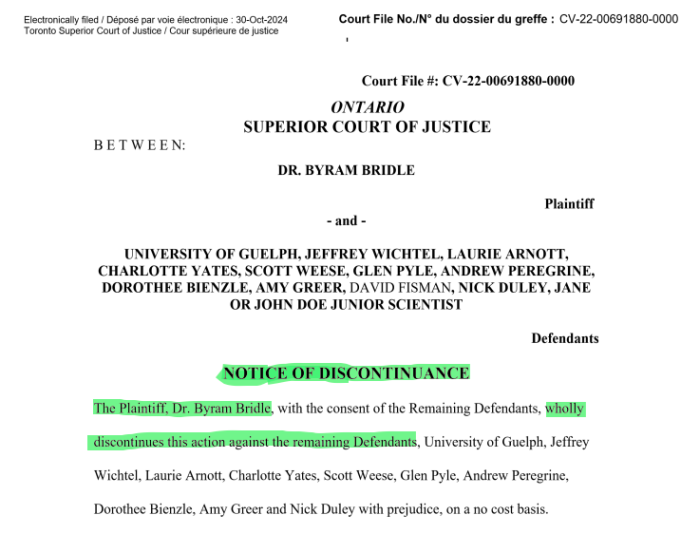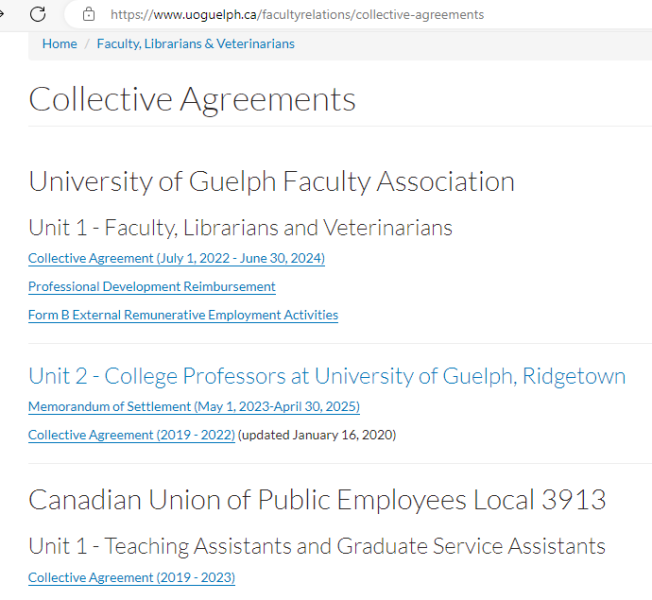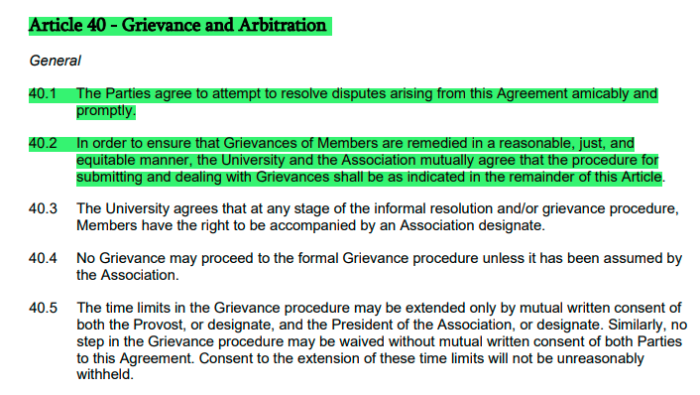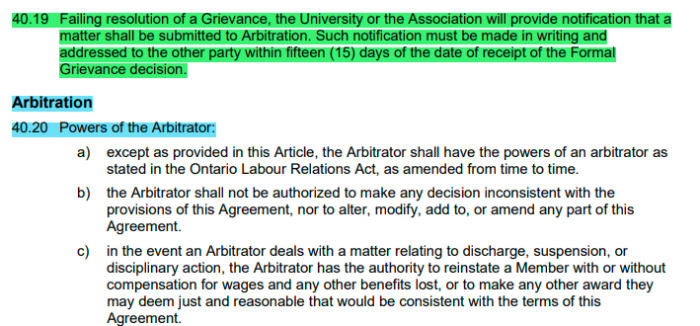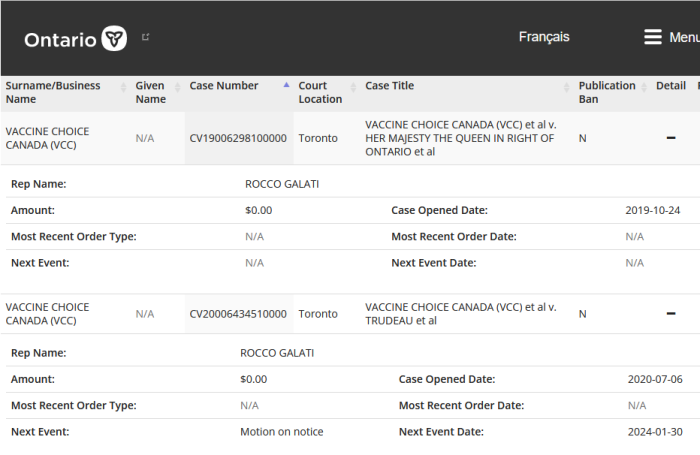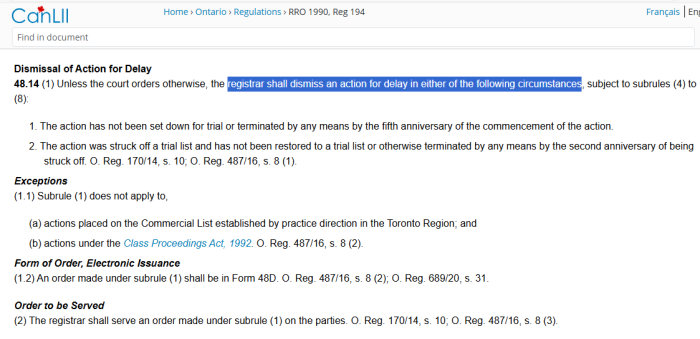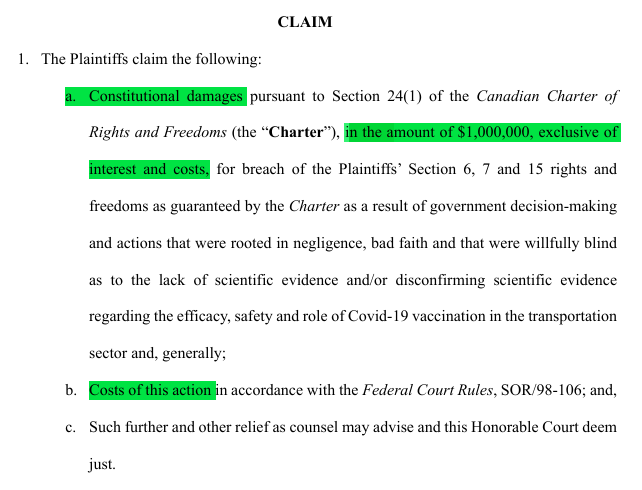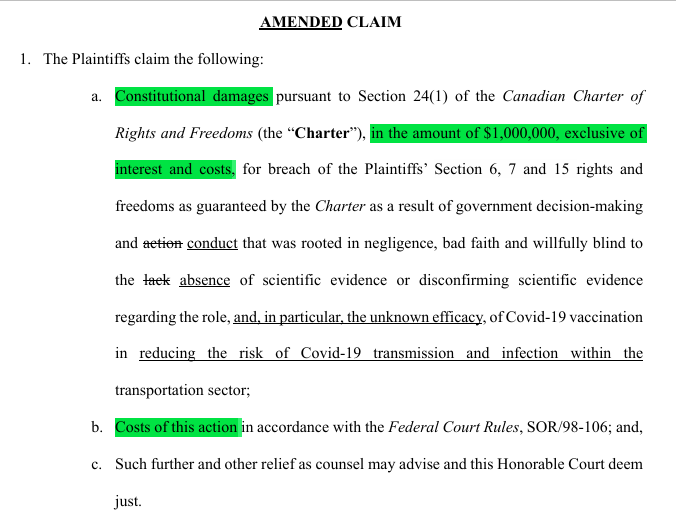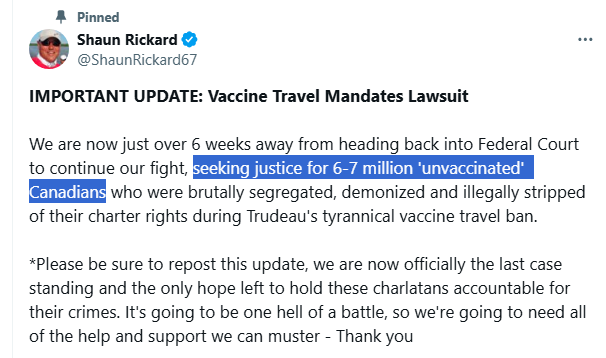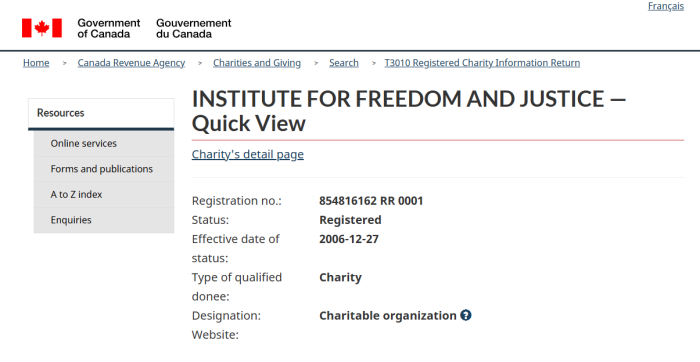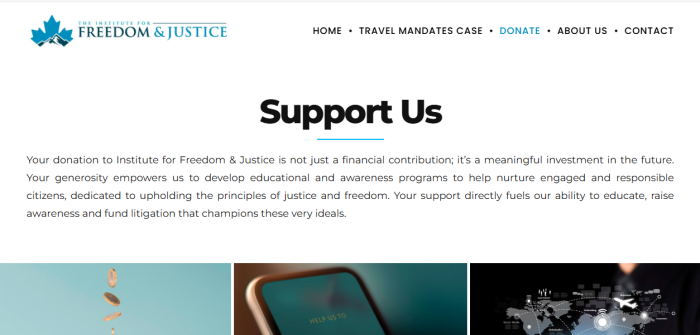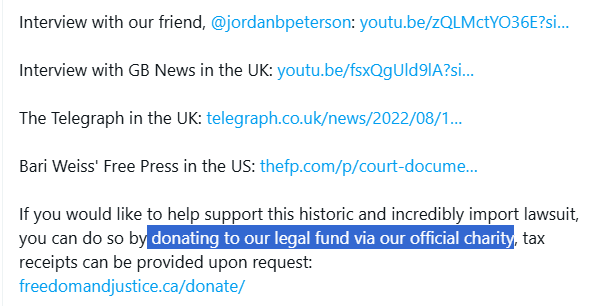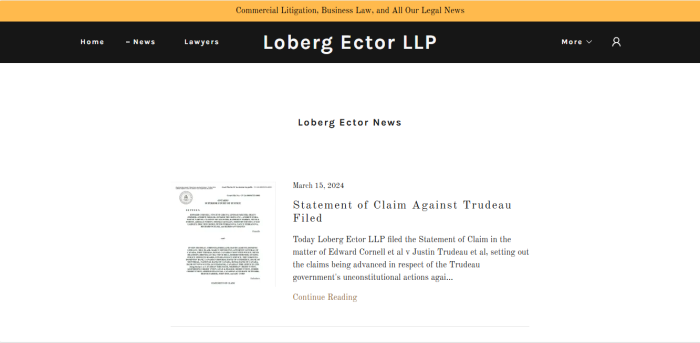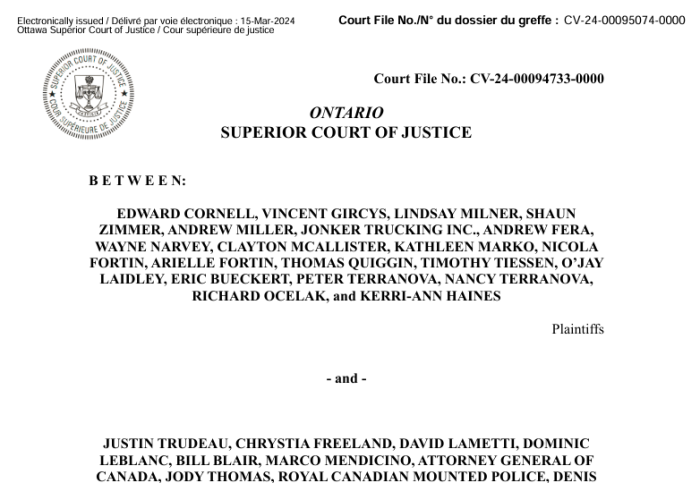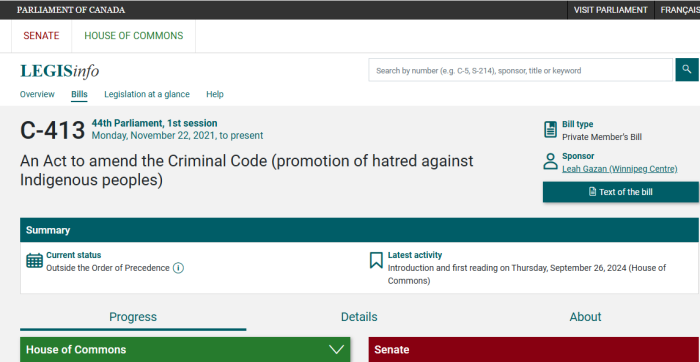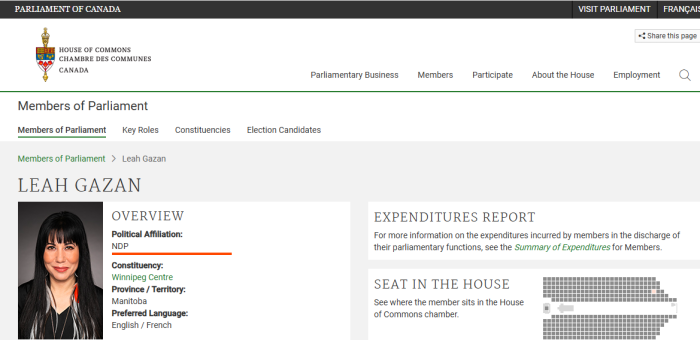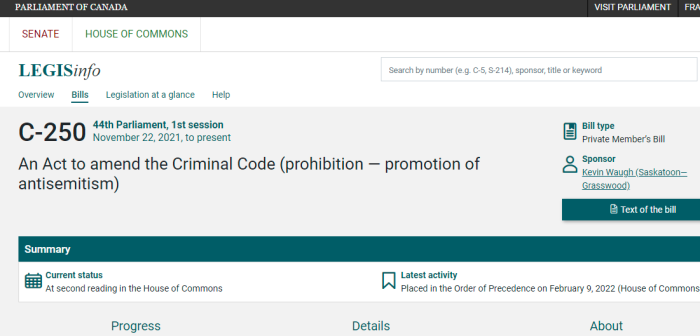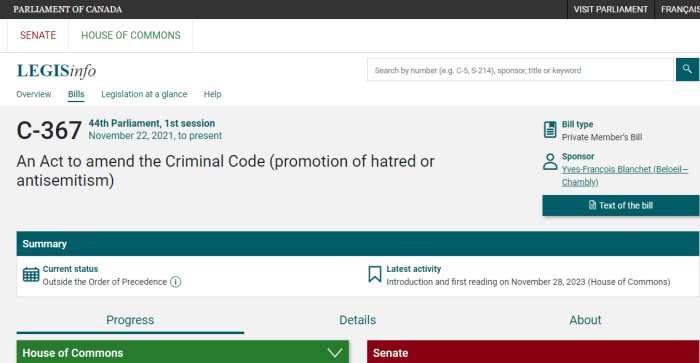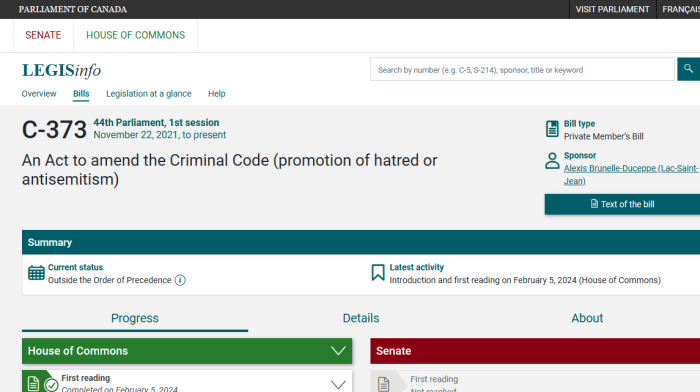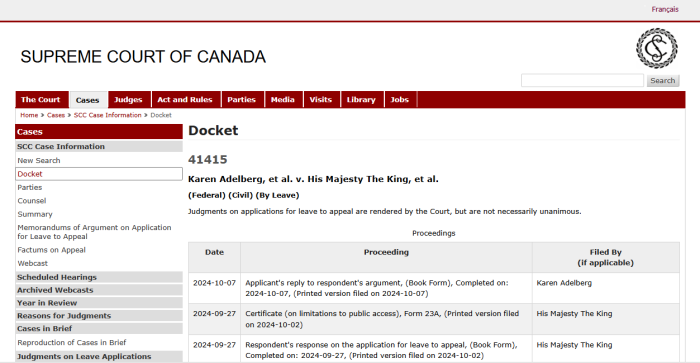
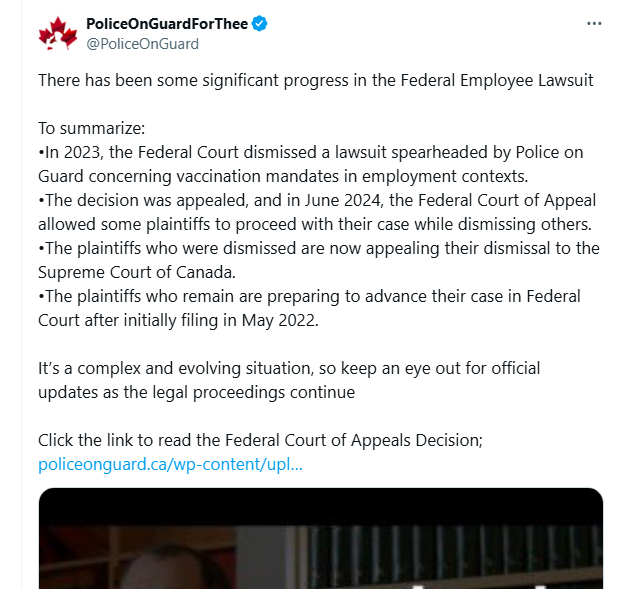
Time to close the case on yet another one. The infamous 600+ Plaintiff suit, Adelberg, is before the Supreme Court of Canada with an Application for Leave. What this means is that the Applicants are asking for permission to have an Appeal heard. This will almost certainly be denied.
See parts 1, 2, 3, 4, 5, 6, 7, 8 and 9 for complete coverage.
The main concern for litigants here is that they were forced out of their jobs back in 2021/2022, when the conditions of their work suddenly required multiple injections. These were the “vaccine passports” that became so notorious. Workers were rightfully angry that the rules were being retroactively changed.
What do the Courts call this? Constructive Dismissal.
By unilaterally changing the terms and conditions of employment, the Federal Government has effectively repudiated the employment contracts of their workers. They’re entitled to notice (at a minimum) and to be paid out fully in accordance with any other agreements they have.
As for third parties (Federally regulated employers) who’ve had to implement injection passports, they too have constructively dismissed their workers. The fact that Ottawa forced them to do it is irrelevant.
Instead of taking their problems to the appropriate forum — Arbitration for most — extremely incompetent counsel crashed all of this into the ground.
Contrary to the postings of “the marketing arms“, such as Police On Guard, this isn’t a complex case. A May 2022 lawsuit involving over 600 Plaintiffs was struck for a variety of reasons. The most embarrassing one was the completely shoddy and inadequate quality of the pleadings.
Justice Fothergill called it “bad beyond argument“.
There were a few passing mentions of Plaintiffs having their travel rights restricted, but at the heart of it, this was about employment.
To help make sense of these 600+ Plaintiffs, it’s important to note that the Court classified them into 2 groups for clarification. These are as follows.
Schedule “A” Plaintiffs, Employees Of Federal Government: These litigants had their employment claims struck in their entirety, without the chance to fix the lawsuit. The reason is that they were entitled to grieve employment claims, but not to litigate. This is explained by Sections 208 and 236 of the Federal Public Sector Labour Relations Act, or FPSLRA. In essence, the Federal Court lacked jurisdiction. This comprised approximately 2/3 of them.
Schedule “B” Plaintiffs, Employees Of “Federally Regulated” Employers: These litigants at least in theory would be able to sue the Government. However, the Statement of Claim was so poorly drafted that it would have to be redone anyway. This was the other 1/3 of Plaintiffs.
Schedule “A” Plaintiffs: Employees Of Federal Government
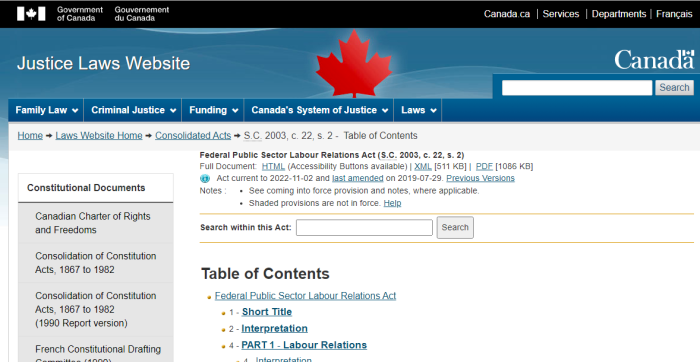
The Federal Public Sector Labour Relations Act, or FPSLRA, is the key to understanding why the Schedule “A” Plaintiffs are completely out of luck. Since they don’t have the right to sue, the Court has no jurisdiction to hear their case, even if it were competently pleaded.
Right of employee
208 (1) Subject to subsections (2) to (7), an employee is entitled to present an individual grievance if he or she feels aggrieved (a) by the interpretation or application, in respect of the employee, of
(i) a provision of a statute or regulation, or of a direction or other instrument made or issued by the employer, that deals with terms and conditions of employment, or
(ii) a provision of a collective agreement or an arbitral award; or
(b) as a result of any occurrence or matter affecting his or her terms and conditions of employment.
No Right of Action
Disputes relating to employment
236(1) The right of an employee to seek redress by way of grievance for any dispute relating to his or her terms or conditions of employment is in lieu of any right of action that the employee may have in relation to any act or omission giving rise to the dispute.
Application
236(2) Subsection (1) applies whether or not the employee avails himself or herself of the right to present a grievance in any particular case and whether or not the grievance could be referred to adjudication.
Section 208 of the FPSLRA gives Federal employees the right to grieve, and that often ends in arbitration. This is similar to how workers in unionized environments, or ones with collective bargaining agreements. Section 236 is the prohibition on seeking remedies in the Courts via lawsuits. This is referred to as a lack of jurisdiction, or an “explicit ouster” from the Court.
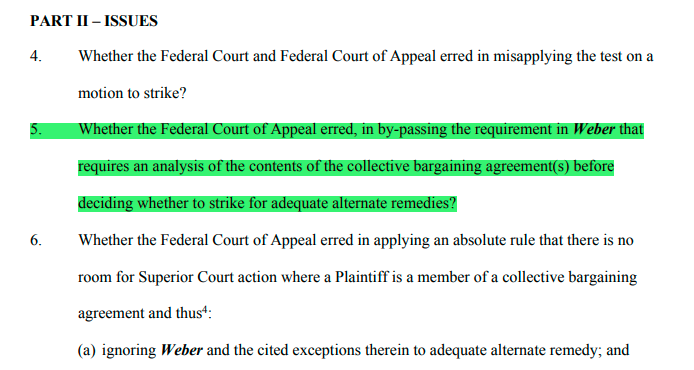
Counsel takes issue with the Federal Court (and later the Court of Appeal) not considering the employment contracts of the Schedule “A” workers prior to striking their claims. But this misses the point. Section 208 FPSLRA gives all Federal employees the right to grieve, and none of them the right to sue. This is regardless of any collective agreements in place. In this sense, the entire Federal Government acts as a giant union.
It’s unclear why counsel keeps citing Weber, the 1995 Supreme Court case, when it effectively shuts down the ability to bring cases to Court if alternative resolution mechanisms are available.
For their response, the Government reiterates that this case (at its heart) is about changes to the terms of their employment agreements. Really, this is constructive dismissal.
In theory, a case could still be brought if each of the Plaintiffs had diligently tried to exercise other options to resolve their case. It would involve overhauling the Statement of Claim, with each person describing what efforts they took. They’d have to provide specifics, and be prepared to submit Affidavit evidence when jurisdiction would inevitably be challenged. They’d have to convince a Judge that there was no other option than to sue. Even then, there are no guarantees, and it could still be tossed out.
Schedule “B” Plaintiffs: Employees Of “Federally Regulated” Industries
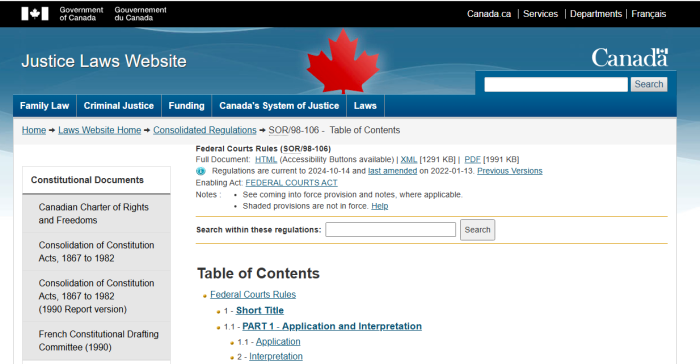
173 (1) Pleadings shall be divided into consecutively numbered paragraphs.
Allegations set out separately
(2) Every allegation in a pleading shall, as far as is practicable, be set out in a separate paragraph.
Material facts
174 Every pleading shall contain a concise statement of the material facts on which the party relies, but shall not include evidence by which those facts are to be proved.
Particulars
181 (1) A pleading shall contain particulars of every allegation contained therein, including
(a) particulars of any alleged misrepresentation, fraud, breach of trust, willful default or undue influence; and
(b) particulars of any alleged state of mind of a person, including any alleged mental disorder or disability, malice or fraudulent intention.
Pleading facts refers to spelling out the who, what, where, when and how that events have transpired. There must be sufficient detail that Defendants are able to at least address the allegations.
Pleading particulars refers to detailing any acts of malice, bad faith, conspiracy, malfeasance, etc… The events must be described in enough detail that they can be responded to.
In spite of the Statement of Claim being 50 pages long, there is stunningly little material.
- The first 15 pages are just the Style of Cause (naming Parties)
- The next 9 pages are the Relief Sought (what is asked of the Court)
- There are 2 pages of background information on the defendants
- There are 5 pages of “facts”, which are actually potential expert evidence, and don’t belong at this stage of the proceeding
- There are 6 pages of stating torts, but without pleading necessary facts or particulars
- The Statement of Claim then just devolves into a Factum, arguing endlessly, but without providing the information needed to respond to by the Defendants
There’s no facts or background pleaded about the Plaintiffs, and only a handful are even named at all.
The Claim also makes allegations of: (a) Criminal Code of Canada violations; (b) breaches of the Nuremberg Code; (c) crimes against humanity; (d) violations of the Helsinki Declaration; and (e) reference the International Criminal Court in the Hague. All of this helped get the case struck, since there’s no jurisdiction for a Civil Court to hear any of it.
Remember, these defects also apply to the Schedule “A” Plaintiffs.
The Schedule “B” Plaintiffs might have had a fighting chance if counsel had argued that the injection mandates amounted to an inducement to breach, or interfere with their employment. That was one path forward. But that would require a competent lawyer.
Court Of Appeal Allows Travel Claims
In a strange turn of events, the Federal Court of Appeal did allow for travel claims to still be brought forward by all Plaintiffs. This applies to both Schedules “A” and “B”. However, these claims weren’t properly pleaded (as always) and are probably moot anyway.
Over $1.2 Million Wasted For Garbage Litigation
Each of the more than 600 Plaintiffs had to pay $1,000 retainer in order for the Statement of Claim to be filed in the first place. Then, when it was struck, counsel demanded another $1,000 from everyone. This totals well over a million dollars. And for what?
Plaintiffs Likely Barred By Statute Of Limitations
Regardless of what happens at the Supreme Court, the Plaintiffs are likely out of luck anyway. It’s not just that the Statement of Claim itself has to be filed within 2 years. Any new allegations in an amended version — that occurred over 2 years ago — are typically barred as well. Since nothing was correctly pleaded in 2022, the time has run out to do it properly.
At least this time, the gross deficiencies of the pleadings themselves aren’t being questioned. This includes the lack of facts and particulars included.
While it may sound impressive to be at the Supreme Court, consider the context. This isn’t the conclusion of some long, complex case. It’s about appealing, once again, a Statement of Claim that was struck for lack of jurisdiction. It’s still at the initial stages, and we’re almost into 2025.
We’re close to the end of the “bad beyond argument” Covid cases. The only major one left is Dorceus, which is out on a Motion to Strike in Ontario. Here are 18 reasons that case will be thrown out.
FEDERAL LAXX PASS CHALLENGE (SCC LEAVE APPLICATION)
(1) Adelberg SCC Leave Application Volume 1
(2) Adelberg SCC Leave Application Volume 2
(3) Adelberg SCC Leave Application Volume 3
(4) Adelberg SCC Written Submissions Applicant
(5) Adelberg SCC Leave Application Volume Respondents
(6) Adelberg SCC Leave Application Reply Submissions
FEDERAL VAXX PASS CHALLENGE (APPEAL)
(1) FCA Adelberg V. HMTK A-67-23 Notice Of Appeal
(2) FCA Adelberg V. HMTK A-67-23 Appeal Book
(3) FCA Adelberg V. HMTK A-67-23 Appellants MFL
(4) FCA Adelberg V. HMTK A-67-23 Respondents MFL
FEDERAL VAXX PASS CHALLENGE
(1) https://policeonguard.ca/wp-content/uploads/2022/06/Filed-SOC.pdf
(2) Federal Court Vaccine Mandate Challenge
(3) Federal Vaccine Passport Challenge Retainer Agreement
(4) Federal Court Vaccine Mandate Challenge Motion To Strike
(5) Federal Court Vaccine Mandate Challenge Affidavit Of Service
(6) Federal Court Vaccine Mandate Challenge Responding Motion Record
(7) Federal Court Of Canada Rules
(8) Federal Court Decision On Motion To Strike (Archive)
(9) https://decisions.fct-cf.gc.ca/fc-cf/decisions/en/item/522970/index.do
(10) https://www.canlii.org/en/bc/bcsc/doc/2022/2022bcsc1507/2022bcsc1507.html
(11) https://laws-lois.justice.gc.ca/eng/regulations/sor-98-106/page-9.html#h-1013947
(12) https://www.laws-lois.justice.gc.ca/eng/acts/P-33.3/page-13.html#h-406405
PRECEDENTS CREATED
(1) https://www.canlii.org/en/ca/fct/doc/2023/2023fc280/2023fc280.html#par85
(2) https://www.canlii.org/en/ca/fct/doc/2023/2023fc929/2023fc929.html#par17
(3) https://www.canlii.org/en/bc/bcsc/doc/2023/2023bcsc1701/2023bcsc1701.html#par30
(4) https://www.canlii.org/en/ca/fct/doc/2023/2023fc1752/2023fc1752.html#par24
(5) https://www.canlii.org/en/ca/fct/doc/2024/2024fc137/2024fc137.html#par44
MONEY
(1) Letter to Federal Worker Plaintiffs
(2) Federal Workers Action Donation Link For PayPal
(3) Ontario First Responders Action Donation Link For PayPal
(4) School Action Donation Link For PayPal
(5) Police Officer Action Donation Link For PayPal
(6) https://www.web.archive.org/web/20220526170932/https://www.constitutionalrightscentre.ca/
(7) Federal Workers Retainer Agreement
(8) Ontario First Responders Retainer Agreement
(9) Donate To Public Citizens Inquiry
(10) Donations For Supposed B.C. Doctors Action

